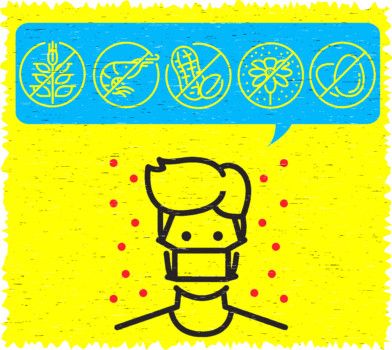
Living with food allergies is not easy. In fact, I can quite confidently say it affects almost every aspect of my life. For as long as I can remember, I have been severely allergic to peanuts, nuts, eggs, sesame seeds and legumes such as chickpeas, beans and lentils.
My allergies have been the source of many tears and frustrations growing up, as well as several trips to the hospital. It’s made my life a lot more challenging, but it’s also made me grow up quickly and learn how to be responsible for myself from a young age. Still, there are many other people like me — in America alone, researchers estimated that 32 million people have food allergies.
Simply put, an allergic reaction is an overreaction from the body’s immune system to a harmless food protein — an allergen. Allergic reactions can range from mild to very serious, the latter being called ‘anaphylaxis’. In the case of anaphylaxis, suffers may find it difficult to breathe, experience a tightening of the throat, and may lose consciousness. Personally, my food allergies trigger anaphylaxis, which means that an allergic reaction for me is potentially life-threatening, and if not dealt with swiftly and correctly, can result in death.
■ Following the use of an EpiPen, it is imperative that the person is immediately taken to hospital.
■ If someone close to you is suffering from life-threatening food allergies, I would suggest becoming EpiPen-trained or at the very least have it explained to you by the person carrying the EpiPen.
During my everyday life, I carry at least two EpiPens with me. An EpiPen is an auto-injectable device which delivers epinephrine, also known as adrenaline. During a life-threatening anaphylactic shock, an injection of adrenaline is able to shut down the allergic response. It constricts blood vessels, which leads to increased blood pressure, and therefore allows the muscles around the airways to relax and for the lungs to open, halting the reaction. There is, however, always the possibility of a secondary reaction — hence why I always carry around two, in case one isn’t enough. Here I must stress that if someone you know is suffering from anaphylactic shock, the most important thing to do is to call an ambulance.
Becoming EpiPen-trained
Following the use of an EpiPen, it is imperative that that person is immediately taken to hospital. If someone close to you is suffering from life-threatening food allergies, I would suggest becoming EpiPen trained or at the very least have it explained to you by the person carrying the EpiPen.
Understandably, growing up with all of this information and responsibility was a lot to cope with. When other children would happily go to ‘play-dates’ or parties, an invitation for me would come with a list of requirements, which some people were not prepared to be responsible for. A birthday cake at other parties was often an awkward and upsetting situation for me, which my wonderful mother was able to remedy by giving me my own egg-free cupcakes to take to parties, which allowed younger me to not feel excluded. Now, as an adult, the most difficult part is my fight for independence.
Living with a condition that affects almost every decision I make is difficult, but thankfully it is both possible and manageable. I am lucky enough to have wonderful friends and family who both understand the severity of my condition, but also make handling my food requirements seem like an easy job — something that deeply moves me. Socially, dealing with allergies is often the most challenging part, as it’s often hard not to feel ‘difficult’, or that you’re causing hassle for other people. Now, I’ve come to realise that it is not worth risking my life over embarrassment or fear of asking the necessary questions at a dinner table. Thankfully, today people are much more willing and able to help.
Growing awareness
Food allergies are serious, and should be taken seriously. Unfortunately for me and others like me, as of yet there is no cure. However, there is a growing awareness and support for people with food allergies globally. Earlier this year, I joined the Teal Community, a Dubai-based group, in raising awareness for families living with food allergies. Being able to talk to many parents with young children who are struggling to navigate the difficulties of living with food allergies was an empowering moment for me.
I met other allergic people older than me who had been able to travel to countries I thought I could never go to because of the nature of my allergies. I was able to encourage others behind me in this journey, and be inspired by those ahead of me. That evening gave me hope, and made me realise that whilst living with food allergies is definitely a challenge, it’s one I’m willing to rise to.
— Nina Mul is a student based in Dubai









